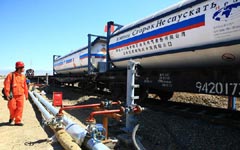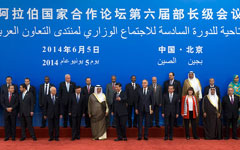This has been embodied by the settlement of several trade disputes, and the establishment of a long-term strategic partnership alongside the negotiation of a stand-alone bilateral investment treaty, prior to Xi's trip to Europe.
The moves have opened the door to deepening links.
Those disputes had escalated from September 2012, when the European Commission launched an anti-dumping and anti-subsidy investigation against solar panels imported from China.
 |
 |
Two months later the Chinese Ministry of Commerce responded with an anti-dumping and anti-subsidy investigation on solar grade silicon LLC exported from the EU.
An anti-dumping probe into European wine imports by China followed in June 2013, after the EU started an investigation into telecom communication devices exported from China.
The EU wine probes were viewed as an attack against the three major wine makers in Europe, particularly, France, Italy and Spain, who then strongly supported the previous probe on solar panels.
The solar case was eventually settled in July 2013 with a price floor of 0.57 euro per watt and an annual quota of 7 gW.
The European Committee of Wine Companies and the China Alcoholic Drinks Association announced the termination of the anti-dumping probe against European winemakers in a memorandum of understanding signed on March 18 this year.
On the same day, the largest exporter of solar grade silicon in Europe, Wacker Chemie AG, reached an agreement with the Ministry of Commerce on the floor of silicon products imported price from the EU to China, in exchange for the waiving of anti-dumping and anti-subsidy taxes.
In response, the European Commission announced on March 27 the end to the anti-dumping probe on made-in-China telecom communication products.
Amid the US "Pivot to Asia" strategy, a Sino-European axis has the potential to rebalance world power dynamics.
Herman Van Rompuy, the president of the European Council, has already highlighted the success of constructive collaboration beyond economic relations.
The urgent need for structural reform of trade links, amid a backdrop of weak global recovery and rising geopolitical uncertainty, is now the main driver behind more promising cooperation between China and Europe.
The China-EU 2020 Strategic Agenda, announced last year, a decade after the confirmation of a comprehensive partnership between China and the EU, was one of the major focuses of Xi's visit to Europe. Both sides have agreed to fully promote the China-EU 2020 Strategic Agenda and start its revision during the coming 17th China-EU summit.
The agenda has four components: safety and security, economic and trade cooperation, sustainable development, and cultural communication. A more ambitious free trade agreement targeted at more bilateral openness is likely to be concluded in the medium term after the signing of the Sino-EU bilateral investment treaty, according to EU officials.
Some EU companies are still concerned over China's domestic policies, which they say give unfair advantages to local manufacturers. Questions remain, for example, on discriminating non-tariff measures against foreign companies, non-transparent government procurement policies, the dominance of the country's State-owned enterprises, and poor intellectual property rights protection.
Foreign direct investment levels between China and Europe also remain unbalanced, with just 2.5 percent of FDI flowing into the EU in 2012 coming from China, while the EU's investment in the other direction represented a quarter of all China's inward FDI.
So deeper cooperation in trade, based on a clear and fair institutional framework, could work toward reducing that imbalance and also counterbalance US trade initiatives such as the Transatlantic Trade and Investment Partnership and the Trans-Pacific Partnership, which could create conditions unfavorable to China. For the first time officially, the EU has shown strong support for China's participation in the Trade in Services Agreement negotiations.
The author is head of research and chief economist at Haitong International Securities based in Hong Kong. The views do not necessarily reflect those of China Daily.
